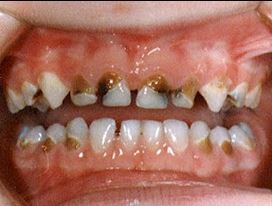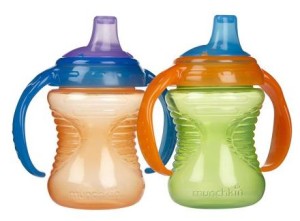Sippy cups were developed for toddlers who have outgrown bottles but are too young to manage a full-size cup on their own. Parents love sippy cups for their spill proof features and toddlers love them as a comfort item, much like a favourite toy.
The sippy cup was developed as a transitional cup between the baby bottle and a regular cup but often they are being used for prolonged periods of time. They are very much like a baby bottle except that when toddlers drink from the sippy cup, the liquid they drink, bathe all the upper front teeth. And if that liquid contains any sugar, those teeth can be exposed all day long.
What Are The Negative Effects of Sippy Cups?
 Tooth Decay – if the drinks inside the sippy cup contain milk or juice, the sugar in these drinks will increase the risk for decay due to prolonged exposure. Baby teeth are meant to hold space for the permanent teeth and severe decay may lead to some of those baby teeth needing to be removed which can affect the development of the permanent teeth as well.
Tooth Decay – if the drinks inside the sippy cup contain milk or juice, the sugar in these drinks will increase the risk for decay due to prolonged exposure. Baby teeth are meant to hold space for the permanent teeth and severe decay may lead to some of those baby teeth needing to be removed which can affect the development of the permanent teeth as well.- Movement of Teeth – Pressure from the continuous sucking motion can cause the front teeth to move back.
Tips for Parents using Sippy Cups:
 Use sippy cups as a transitional cup only and switch to big cups as soon as possible.
Use sippy cups as a transitional cup only and switch to big cups as soon as possible.- Do not allow toddlers to use the sippy cup throughout the day. Only use them at snacks and mealtimes.
- Give milk only at mealtimes and water the rest of the day, especially before bed. Avoid juice if possible, as a cup of apple or orange juice can contain up to 8 teaspoons of sugar!
- Be sure to brush with a fluoridated toothbrush. A grain-sized amount before age 3 and a pea-sized amount for after age 3.
- Visit your dentist regularly at least every 6 months to catch any dental problems early.


